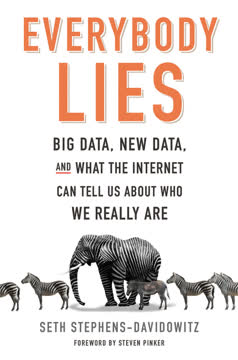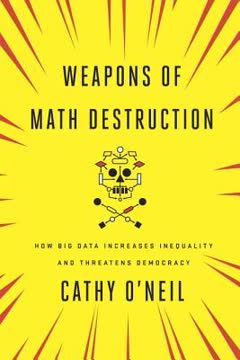Searching...
Top 10 Books on Phenomenological Research Methods
Explore 10 essential books that delve into phenomenological research methods, offering insights into human experience and understanding.
Book Summaries
Big Data, New Data, and What the Internet Can Tell Us About Who We Really Are
Seth Stephens-Davidowitz uses big data to uncover hidden truths about human behavior, providing a unique perspective on societal trends that aligns with phenomenological inquiry.
3 Key Takeaways:
- Google searches reveal hidden truths about human behavior
- Big Data offers new insights into racism and prejudice
- Internet behavior exposes our true sexual desires and preferences
How Big Data Increases Inequality and Threatens Democracy
Cathy O'Neil's exploration of the ethical implications of big data provides critical insights into societal structures, making it a valuable resource for understanding human experiences.
3 Key Takeaways:
- Big Data algorithms can become Weapons of Math Destruction (WMDs)
- WMDs often punish the poor and reinforce inequality
- College rankings exemplify how WMDs can distort entire systems
How to Think Like Sherlock Holmes
Maria Konnikova's insights into critical thinking and observation skills are essential for phenomenological research, enhancing understanding of human behavior.
3 Key Takeaways:
- Cultivate a mindful approach to thinking and observation
- Harness the power of imagination in problem-solving
- Master the art of deduction through systematic reasoning
Former CIA Officers Teach You How to Detect Deception
This book offers practical techniques for detecting deception, enhancing your understanding of human interactions and motivations, which is vital for phenomenological research.
3 Key Takeaways:
- Deception detection is a skill that can be learned and applied in everyday life
- The "Spy the Lie" methodology focuses on timing and clusters of deceptive behaviors
- Verbal deception indicators include failure to answer, denial problems, and convincing statements
The FBI's Legendary Mindhunter Explores The Key To Understanding And Catching Violent Criminals
John E. Douglas, a former FBI agent, provides a deep dive into the psychological motivations behind violent crimes, making this book essential for understanding human behavior through a phenomenological lens.
3 Key Takeaways:
- Understanding criminal motivation is crucial for solving crimes
- Behavioral evidence reveals patterns in serial offenders
- Childhood trauma often contributes to violent behavior in adulthood
Learning from Data
David Spiegelhalter's engaging approach to statistics helps readers understand data interpretation, a crucial skill for phenomenological research and analysis.
3 Key Takeaways:
- Statistics: The Art of Learning from Data
- Turning the World into Data: Challenges and Opportunities
- Probability: The Language of Uncertainty and Variability
Machine Learning and Human Values
Brian Christian's exploration of AI ethics and human values provides a critical framework for understanding the implications of technology on human experiences.
3 Key Takeaways:
- The Alignment Problem: Ensuring AI Systems Behave as Intended
- From Perceptrons to Deep Learning: The Evolution of Neural Networks
- Bias in AI: Uncovering and Addressing Systemic Issues
Serendipity, Energy and the Saving of Time
Matt Ridley's insights into the nature of innovation highlight the importance of human experience and collaboration, key themes in phenomenological research.
3 Key Takeaways:
- Innovation is gradual, not sudden
- Serendipity plays a crucial role in innovation
- Innovation often comes from recombining existing ideas
The Universal Laws of Success
Albert-László Barabási's scientific exploration of success offers insights into the interconnectedness of human experiences, relevant for phenomenological studies.
3 Key Takeaways:
- Success is a collective phenomenon, not an individual one
- Performance drives success when measurable, networks when not
- Performance is bounded, but success is unbounded












